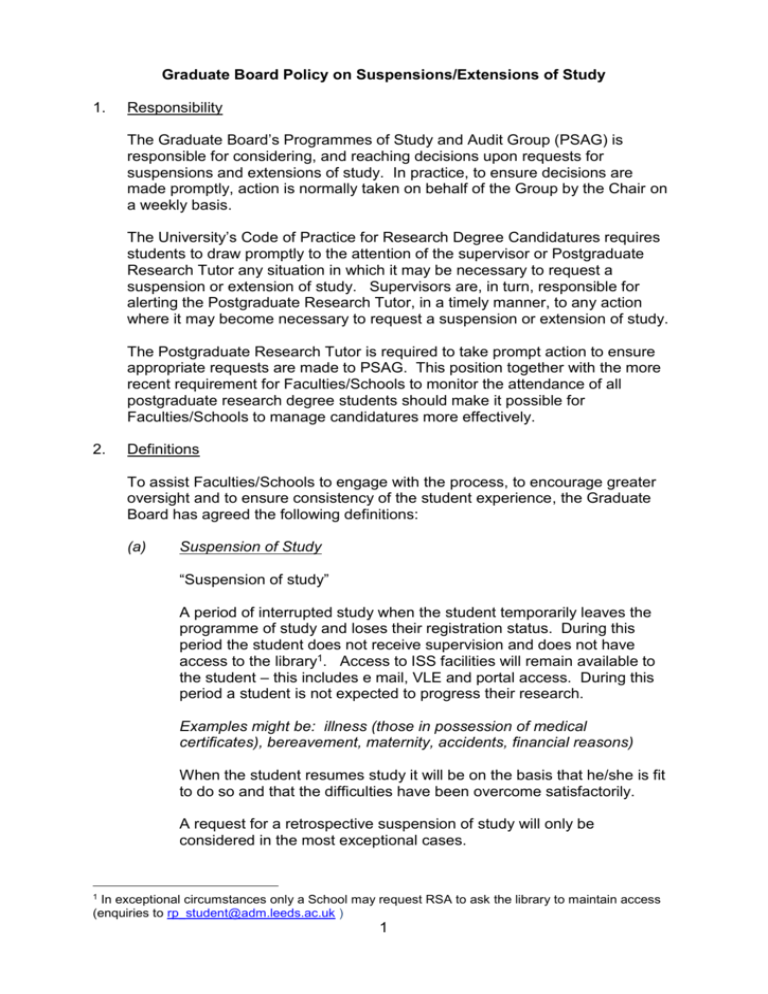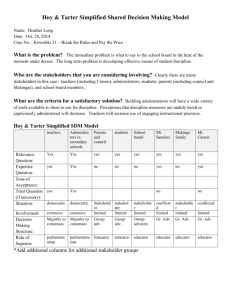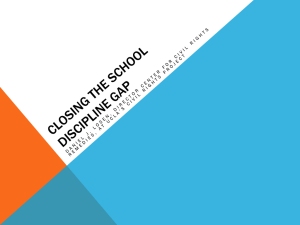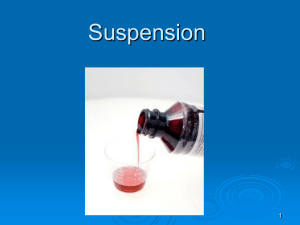Suspensions/Extensions
advertisement

Graduate Board Policy on Suspensions/Extensions of Study 1. Responsibility The Graduate Board’s Programmes of Study and Audit Group (PSAG) is responsible for considering, and reaching decisions upon requests for suspensions and extensions of study. In practice, to ensure decisions are made promptly, action is normally taken on behalf of the Group by the Chair on a weekly basis. The University’s Code of Practice for Research Degree Candidatures requires students to draw promptly to the attention of the supervisor or Postgraduate Research Tutor any situation in which it may be necessary to request a suspension or extension of study. Supervisors are, in turn, responsible for alerting the Postgraduate Research Tutor, in a timely manner, to any action where it may become necessary to request a suspension or extension of study. The Postgraduate Research Tutor is required to take prompt action to ensure appropriate requests are made to PSAG. This position together with the more recent requirement for Faculties/Schools to monitor the attendance of all postgraduate research degree students should make it possible for Faculties/Schools to manage candidatures more effectively. 2. Definitions To assist Faculties/Schools to engage with the process, to encourage greater oversight and to ensure consistency of the student experience, the Graduate Board has agreed the following definitions: (a) Suspension of Study “Suspension of study” A period of interrupted study when the student temporarily leaves the programme of study and loses their registration status. During this period the student does not receive supervision and does not have access to the library1. Access to ISS facilities will remain available to the student – this includes e mail, VLE and portal access. During this period a student is not expected to progress their research. Examples might be: illness (those in possession of medical certificates), bereavement, maternity, accidents, financial reasons) When the student resumes study it will be on the basis that he/she is fit to do so and that the difficulties have been overcome satisfactorily. A request for a retrospective suspension of study will only be considered in the most exceptional cases. 1 In exceptional circumstances only a School may request RSA to ask the library to maintain access (enquiries to rp_student@adm.leeds.ac.uk ) 1 Requests for indefinite suspensions Bearing in mind that Faculty/School structures change with time, supervisors leave for various reasons, and a topic, once original may not remain so indefinitely, it is extremely unlikely that a request for an indefinite suspension will be granted. The norm at present is for a period of up to 12 months suspension to be considered, with a review at the end of that period. (b) Extension of Study “Extension of study” A lengthening of the candidature to take account of a period of disruption to studies. The student will not leave the programme of study and will normally continue to progress their research but with some disruption of study slowing progress rather than interrupting progress completely. Examples might be: equipment breakdown, minor illness or recovery from accident/surgery, personal difficulties, family illness. Or in very exceptional cases where the research of a PhD student reveals a substantial quantity of unexpected new material during the third year of full-time study consideration might be given to an extension of up to one year. (Such requests will normally be made at the stage at which the event occurs and, in any case, prior to the completion of the standard period of study. In the case of a request made on academic grounds this should be made towards the end of the standard period of study). Cases will be expected to show that some unforeseen and unforeseeable circumstances have arisen which have significantly and adversely affected the progress of the research of the student and against which precautions could not reasonably have been taken. It is good practice, when the period of extension of study is sought during the over-time period, for the supervisor and the student to agree a timetable for completing the writing up of the thesis which includes milestones. In some cases the Chair of PSAG may require sight of the timetable for completion before considering an extension request. In the case of Masterships by Research the maximum period of extension permitted on academic grounds is 3 months. 3. Mechanism Requests for suspensions and extensions of study for individual students must be made via the Faculty/School’s Postgraduate Research Tutor and sent to Research Student Administration (RSA). RSA will then arrange for action on behalf of PSAG to be taken to consider the request. To assist Faculties/Schools, and to avoid unnecessary delays, a pro forma has been introduced: 2 http://www.leeds.ac.uk/rsa/assets/word/Forms/SuspensionExtensionForm.doc Faculties/Schools are encouraged to use the pro forma whenever possible. When a request is approved by or on behalf of PSAG, RSA will issue a letter to the student confirming the details. The letter will be sent to the student c/o the Faculty/School. It is anticipated that the Faculty/School will ensure that the letter is forwarded to the student as it will be in the best position to identify their current location. A copy of the letter will be scanned and sent to the Faculty/School PGR Administrator/Secretary. This individual is responsible for ensuring relevant Faculty/School staff are made aware of the position. The BANNER record will also be updated to show the suspension/extension and revised maximum time limit (SWARDAT). Students are advised to check any implications of a suspension of study on their funding with their scholarship awarding body or provider, and where relevant, to check the implications for immigration status with the International Student Office. 4. Documentary Evidence Students are required to submit documentary evidence (eg medical certificate) in support of requests for suspensions and extensions of study where appropriate. This evidence should be retained by the Faculty/School and not forwarded to RSA. RSA will check, however, that the Faculty/School holds supporting documentary evidence (where appropriate). Students who have taken suspensions of study on medical grounds will be required to provide their parent Faculty/School with evidence that they are fit to resume study at the end of the period of suspension (eg doctor’s note). 5. Grounds for Suspension/Extension of Study Cases where the PSAG is likely to be sympathetic to an application for suspension/ extension include: Accidents. Death of a close relative. Ill health (of the student) (accompanied by a medical note). Serious ill health of a close relative (especially where the student has to assume the role of carer). Unexpected events e.g. theft, (accompanied by a police report), equipment not being delivered. Maternity (the student should make a request before the maternity leave is due to begin). Problems beyond the control of the student (e.g. problems originating in the school, such as the supervisor leaving or retiring and, in unfortunate circumstances, the death of the supervisor). Cases where the PSAG is unlikely to be sympathetic to a request for suspension/extension include: 3 When the student has completed the standard period of study on a fulltime basis and is now in the overtime period and is now in full-time employment and is making a request on the basis of “pressures of work” Where the request is based on the grounds that the student has got married/honeymoon period. The Group is of the view that this should normally be taken from the student’s annual leave entitlement. Where there is no clear relationship between the amount of extra time being requested and the problem being encountered by the student. In all cases the length of time requested needs to be specified and reasonable, in the sense that it bears some relation to the events experienced by the student. Requests for suspensions of study will be considered in whole months only. For administrative purposes suspensions will begin on the 1st day of the month and end on the last day of the month. 6. Attendance Monitoring Policy for all Students Monitoring of attendance is recognised as an important element in supporting both student retention and performance and since March 2010 the University has had an Attendance Monitoring Policy for all students http://www.leeds.ac.uk/rsa/induction_progressandmonitoring/forstaff/for_staff.html In addition, there are additional requirements placed upon the University by the UK Border Agency (UKBA) in relation to international students who are in the UK on a Tier 4 Points Based System Student Visa. UKBA expects students on long term suspensions to return to their country of origin. It is, therefore, essential that RSA is informed immediately when a student finds it necessary to suspend their studies so that the Office may report the suspension to UKBA where appropriate. RSA will inform both the student and School concerned that a report to UKBA has been made. Failure to comply with this requirement could jeopardise the University’s Highly Trusted Sponsor status. 7. UKBA Attendance Monitoring Requirements in relation to International Students who are in the UK on a Tier 4 Points Based System Student Visa The arrangements described above will apply equally to UK/EU and international students. However, where an international student receives a suspension of study UKBA expects them to leave the country. It is understood that international students in receipt of a suspension will be permitted to remain in the UK for a period of up to 60 days during which time no attendance monitoring is necessary. After 60 days they should leave the UK if they do not return to study. During an extension of study attendance should be monitored in accordance with established University policy. If the student fails to attend the University must report the situation to UKBA (see 6. above). International students (in the UK with permission as a student) are advised to contact the International Student Office if they have not already done so for 4 immigration advice on the implications of a suspension or extension of study to their research degree candidature to their visa status. The International Student Office can be contacted at: 0113 343 3930 or Email: internationalstudents@leeds.ac.uk 8. Maternity Leave for International Students The University has identified two possible options for an international student who becomes pregnant during their period of study and wishes to take maternity leave: Option One: student suspends study and leaves the UK (if the period of suspension is in excess of two months) Option Two: student suspends registration for up to two months and then resumes study. A limited period of extension might also be sought to take account of the additional responsibilities the student now faces and the associated disruption to studies. The supervisor and the student should agree a working pattern and the supervisor must be in a position to monitor attendance in accordance with the University’s Attendance Monitoring Policy throughout the remainder of the period of study and registration. International students considering options for maternity leave should seek advice as early as possible as possible health reasons may restrict times at which flying is advisable or even permitted by an airline. 9. Sponsor/Awarding Body Students should be advised to check any implications of a suspension/extension of study on their funding with their scholarship awarding body or provider. 10. Research Councils Set out below is further advice on arrangements for candidates holding research council funding. (a) Research Councils – Doctoral Training and Doctoral Training Centre Grants (BBSRC, EPSRC, MRC, NERC and STFC) (b) All suspensions and extensions are managed internally by the University School may wish to take advice from the Postgraduate Scholarships Office about the implications for suspensions/extensions of study for individual candidates holding Research Council awards (enquiries to extn 34007 or pg_scholarships@leeds.ac.uk AHRC - Block Grant Partnership Studentship Regulations Suspensions All requests to be sent to Research Student Administration (with a copy to the Postgraduate Scholarships Office). Requests 5 should be made at the time the problem arises and certainly no later than the end of July in the year the student is due to submit. Approval is not required by AHRC, however, AHRC require suspensions to be recorded on Je-S within one month of their commencement. Extensions All requests to be sent to Research Student Administration (with a copy to the Postgraduate Scholarships Office) no later than the end of July in the year the student is due to submit. (c) AHRC will not be grant retrospective extensions and they can only be approved by AHRC once a student has entered into their overtime period. Maximum period of extension 12 months. ESRC Suspensions Suspension requests do not require prior approval by ESRC and are handled according to standard University procedures. Total periods of suspension must not exceed one calendar year during the lifetime of the award (standard period of study). Please note, however, that if a student is in the overtime period, ESRC will expect a student to request an extension to their submission deadline, for which prior approval from ESRC is required – see below. Extensions Overseas University Visits, Internship Schemes, Difficult Language Training are treated by ESRC as extensions but do not require prior approval by ESRC. If successful, the Postgraduate Research Tutor should submit a request for the appropriate extension to Research Student Administration Where a student experiences problems relating to an accident, illness or exceptional personal circumstances during the course of study, the ESRC will consider a case for extending the submission deadline. Extensions to the submission date cannot be considered in retrospect. Any request for an extension to the submission date due to illness cannot be considered unless evidence of illness has been provided at the time of illness. To apply for a submission date extension, students must apply to the ESRC, via their nominated contact, 2-3 months before the submission date deadline. Any request must be supported in writing by their supervisor and be fully supported by medical evidence if based on illness. If successful, the Postgraduate Research Tutor should submit a request for the appropriate extension to Research Student Administration. JYF/ST, Ext 35778, 22/11/11 6





